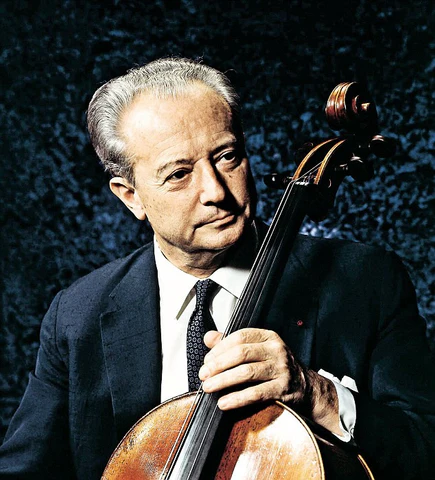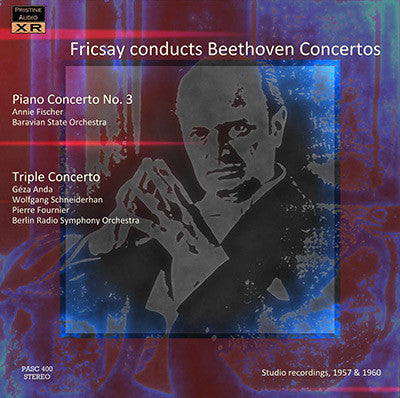Pierre Fournier

Pierre Fournier (24 June 1906 – 8 January 1986) was a French cellist who was called the "aristocrat of cellists," on account of his elegant musicianship and majestic sound.
He was born in Paris, the son of a French Army general. His mother taught him to play the piano, but he had a mild case of polio as a child and lost dexterity in his feet and legs. Having difficulties with the piano pedals, he turned to the cello.
He received early training from Odette Krettly, and from 1918 studied with André Hekking and later with Paul Bazelaire. He graduated from the Paris Conservatory at 17, in 1923. He was hailed as "the cellist of the future" and won praise for his virtuosity and bowing technique. In the period 1925-1929 he was a member of the Krettly Quartet, led by Odette's brother Robert Krettly.
He became well known when he played with the Concerts Colonne Orchestra in 1925. He began touring all over Europe. At various stages he played with many of the most highly acclaimed, prestigious musicians of his time, and recorded the complete chamber music of Brahms and Schubert for the BBC on acetates. However, these deteriorated before the recordings could be transferred to a more durable medium. He is also praised for his recordings of the Bach suites (Beethoven-Saal, Hannover, December 1960), which are regarded even now as some of the best versions ever made. His other discs include LPs of Beethoven's cello sonatas and Elgar's Cello Concerto; these have long since been available on CD.
Fournier was a teacher at the École Normale de Musique in Paris and the Paris Conservatoire from 1937 to 1949. He made his first tour of the United States in 1948 and played to great acclaim in New York and Boston.
His performance in America became an embarrassment when it was revealed in 1949 that Fournier had collaborated with the Nazis during the occupation of France. He was found to have performed 82 times on "Radio-Paris" – a German station – for which he had been paid a total of 192,400 francs. In France, the "National Purging Committee's Professional Branch for Dramatic and Lyric Artists and Performing Musicians" had found him guilty of collaboration, and had banned him from performing for a period of six months.
In the '50s he toured South America, often accompanied by Alfredo Rossi, a personal friend and former colleague during his early days in Italy and Spain.
After 1956, he made his home in Switzerland, although he never relinquished his French citizenship. He received the dedication of both Bohuslav Martinů's Cello Concerto No. 1 (1930, rev. 1939, 1955) and Francis Poulenc's Cello Sonata (1948).
In 1963, he was made a member of the Legion of Honour. He continued performing in public until two years before his death at the age of 79. Until the end of his life, he taught privately at his home in Geneva: the British cellist Julian Lloyd Webber was among his pupils.
His son Jean-Pierre became a pianist performing under the name of Jean Fonda.
Fournier played 3 instruments: a Jean-Baptiste Vuillaume 1863, a Matteo Goffriller 1722 and a rare Charles Adolphe Maucotel 1849. With the Maucoutel he played the last 18 years of his career and made all his recordings.
He was born in Paris, the son of a French Army general. His mother taught him to play the piano, but he had a mild case of polio as a child and lost dexterity in his feet and legs. Having difficulties with the piano pedals, he turned to the cello.
He received early training from Odette Krettly, and from 1918 studied with André Hekking and later with Paul Bazelaire. He graduated from the Paris Conservatory at 17, in 1923. He was hailed as "the cellist of the future" and won praise for his virtuosity and bowing technique. In the period 1925-1929 he was a member of the Krettly Quartet, led by Odette's brother Robert Krettly.
He became well known when he played with the Concerts Colonne Orchestra in 1925. He began touring all over Europe. At various stages he played with many of the most highly acclaimed, prestigious musicians of his time, and recorded the complete chamber music of Brahms and Schubert for the BBC on acetates. However, these deteriorated before the recordings could be transferred to a more durable medium. He is also praised for his recordings of the Bach suites (Beethoven-Saal, Hannover, December 1960), which are regarded even now as some of the best versions ever made. His other discs include LPs of Beethoven's cello sonatas and Elgar's Cello Concerto; these have long since been available on CD.
Fournier was a teacher at the École Normale de Musique in Paris and the Paris Conservatoire from 1937 to 1949. He made his first tour of the United States in 1948 and played to great acclaim in New York and Boston.
His performance in America became an embarrassment when it was revealed in 1949 that Fournier had collaborated with the Nazis during the occupation of France. He was found to have performed 82 times on "Radio-Paris" – a German station – for which he had been paid a total of 192,400 francs. In France, the "National Purging Committee's Professional Branch for Dramatic and Lyric Artists and Performing Musicians" had found him guilty of collaboration, and had banned him from performing for a period of six months.
In the '50s he toured South America, often accompanied by Alfredo Rossi, a personal friend and former colleague during his early days in Italy and Spain.
After 1956, he made his home in Switzerland, although he never relinquished his French citizenship. He received the dedication of both Bohuslav Martinů's Cello Concerto No. 1 (1930, rev. 1939, 1955) and Francis Poulenc's Cello Sonata (1948).
In 1963, he was made a member of the Legion of Honour. He continued performing in public until two years before his death at the age of 79. Until the end of his life, he taught privately at his home in Geneva: the British cellist Julian Lloyd Webber was among his pupils.
His son Jean-Pierre became a pianist performing under the name of Jean Fonda.
Fournier played 3 instruments: a Jean-Baptiste Vuillaume 1863, a Matteo Goffriller 1722 and a rare Charles Adolphe Maucotel 1849. With the Maucoutel he played the last 18 years of his career and made all his recordings.
Close

Pierre Fournier
Pierre Fournier (24 June 1906 – 8 January 1986) was a French cellist who was called the "aristocrat of cellists," on account of his elegant musicianship and majestic sound.
He was born in Paris, the son of a French Army general. His mother taught him to play the piano, but he had a mild case of polio as a child and lost dexterity in his feet and legs. Having difficulties with the piano pedals, he turned to the cello.
He received ...
He was born in Paris, the son of a French Army general. His mother taught him to play the piano, but he had a mild case of polio as a child and lost dexterity in his feet and legs. Having difficulties with the piano pedals, he turned to the cello.
He received ...
Read More
Download from
€9.00
| Buy on CD from €13.00
BEETHOVEN Piano Concerto No. 3
BEETHOVEN Triple Concerto
MOZART 2 Concert Rondos (K.382, K.386) (download-only)
Recorded in stereo, 1957, 1959 & 1960
Total duration: 89:42 (CD: 72:39)
Annie Fischer, piano
Géza Anda, piano
Wolfgang Schneiderhan, violin
Pierre Fournier, cello
Géza Anda, piano
Wolfgang Schneiderhan, violin
Pierre Fournier, cello
Baravian State Orchestra
Berlin Radio Symphony Orchestra
Ferenc Fricsay, conductor
Ferenc Fricsay, conductor

